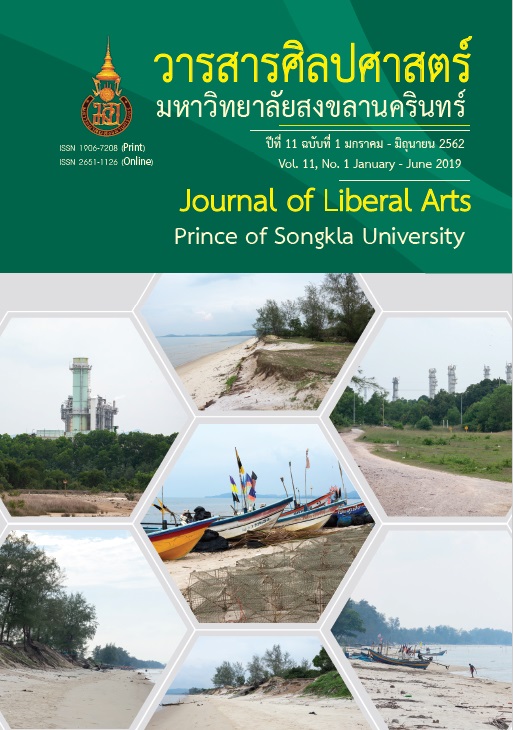A Study on intercultural strategies in English as a lingua franca communication of Naresuan University graduate students
Keywords:
English as a lingua franca, cross-cultural communication, intercultural strategiesAbstract
In the English as a lingua franca (ELF) settings of the ASEAN context, intercultural competence, strategies, and awareness are crucial for preparing English learners to achieve successful communications. This study investigated graduate students’ intercultural strategies and their opinions of challenges in using English as a medium language in cross-cultural communication settings. A survey questionnaire was constructed and administered to the English major graduate students of Naresuan University, Thailand. In the focus group session, seven volunteers were interviewed to elicit their opinions of intercultural experiences of using English in ELF settings. The survey result indicated that the mostly used strategies were clarifying or explaining cultural terms to interlocutors and selecting the conversation topics based on common interests or background experiences. The focus group interview revealed that the participants were aware of some linguistic issues as well as some similarities and differences between cultures, reflecting the need of more exposure to a variety of English used by non-native speakers. Based on the findings, it was suggested that ELF learners adopt intercultural strategies to accommodate mutual understandings in cross-cultural communications.
References
Baker, W. (2012). From cultural awareness to intercultural awareness: Culture in ELT. ELT Journal, 66(1), 62-70.
Barrett, M., Byram, M., Lázár, I., Mompoint-Gaillard, P., & Philippou, S. (2014). Developing intercultural competence through education. Pestalozzi Series No. 3. Strasbourg, Council of Europe Publishing.
Breiteneder, A. (2005). The naturalness of English as a European lingua franca: The case of the third person–s. Vienna English Working Papers, 14(2), 3-26.
Byram, M., Gribkova, B., & Starkey, H. (2002). Developing the intercultural dimension in language teaching: A practical introduction for teachers. Strasbourg: Council of Europe.
Carter, R. (2003). Orders of reality: CONCODE, communication, and culture. In B. Seidlhofer (Ed.), Controversies in Applied Linguistics. (pp. 90-104). Oxford: OUP.
Chomsky, N. (1986). Knowledge of language: Its nature, origin and use. New York: Praeger Scientific.
Crystal, D. (2004). The language revolution. Cambridge: Polity Press.
Geerson, E. B. (2013). The anti-linguistic imperialism of ELF and its implications for English language learning and teaching in Thailand. Thammasat University Journal, 31(3), 49-59.
Gnutzmann, C. (2000). Lingua franca. In M. Byram (Ed.), The Routledge encyclopedia of language teaching and learning (pp. 356-359). London: Routledge.
Jenkins, J. (2007). English as a lingua franca: Attitude and identity. Oxford: Oxford University Press.
Jenkins, J., Cogo, A., & Dewey, M. (2011). Review of developments in research into English as a lingua franca. Language Teaching, 44(3), 281-315.
Kirkpatrick, A. (2007). World Englishes: Implications for international communication and English language teaching. Cambridge: Cambridge University Press.
Kirkpatrick, A. (2013). English as an international language in Asia: Implications for language education. In A. Kirkpatrick & R. Sussex (Eds.), English as an international language in Asia: Implications for language education (pp. 29-44). New York: Springer.
Leung, K. Y .A, Lee, S-I., & Chiu, C-Y. (2013). Meta-knowledge of culture promotes cultural competence. Journal of Cross-Cultural Psychology, 44(6), 992-1006.
MacKenzie, I. (2014). English as a lingua franca: Theorizing and teaching English. London: Routledge.
Matsuda, A. (2003). Incorporating world Englishes in teaching English as an international language. TESOL quarterly, 37(4), 719-29.
Mauranen, A. (2006). A rich domain of ELF: The ELFA corpus of academic discourse. Nordic Journal of English Studies, 5(2), 145-159.
Mauranen, A. (2012). Exploring ELF: Academic English shaped by non-native speakers. Cambridge, UK: Cambridge University Press.
Partnership for 21st Century Skills. (2007). Beyond the three Rs: Voter attitudes toward 21st century skills. Tucson, AZ: Author
Ranta, E. (2006). The ‘attractive’ progressive – why using the –ing form in English as a lingua franca? Nordic Journal of English Studies, 5(2), 95-116.
Seidlhofer, B. (2004). Research perspectives on teaching English as a lingua franca. Annual Review of Applied Linguistics, 24, 209-39.
Seidlhofer, B. (2005). Language variation and change: The case of English as a lingua franca. In K. Dziubalska-Kolaczyk & J. Przedlacka (Eds.), English pronunciation models: A changing scene (pp. 59-75). Bern: Peter Lang.
Seidlhofer, B. (2006). English as a lingua franca in the expanding circle: What it isn't. In R. Rubdy & M. Saraceni (Eds.), English in the world: Global rules, global roles (pp. 40-50). London: Continuum.
Seidlhofer, B. (2011). Understanding English as a lingua franca. Oxford: Oxford University Press.
Seidlhofer, B., & Widdowson, H. G. (2009). Accommodation and the idiom principle in English as a lingua franca. In K. Murata & J. Jenkins (Eds.), Global Englishes in Asian contexts: Current and future debates (pp. 26-39). Basingstoke: Palgrave Macmillan.
Sharifian, F. (2009). English as an international language: An overview. In F. Sharifian (Ed.), English as an international language (pp. 1-18). Multilingual Matters.
Sharifian, F. (2010). Glocalization of English in world Englishes: An emerging variety among Persian speakers of English. In M. Saxena & T. Omoniyi (Eds.), Contending with globalization in World Englishes (pp. 137-158). Multilingual Matters.
Sharifian, F. (2013). Globalization and developing metacultural competence in learning English as an international language. Springer Open Journal. Retrieved 20 August, 2014 from http://multi-lingual education.com/content.
Wacker, E. (2011). English as a lingua franca and the third person–s. BA thesis, University of Vienna. Retrieved on October 8, 2016 from http://www.univiie. ac.at/voice/page/abstracts/wacker_2011_full.pdf.
Widdowson, H.G. (2004). A perspective on recent trends. In A.P.R. Howatt (Ed.), A History of English teaching (2nd ed.) (pp. 353-372). Oxford: Oxford University Press.
Downloads
Published
How to Cite
Issue
Section
License
The authors retain the copyright to their article but the Journal of Liberal Arts, Prince of Songkla University reserves the exclusive rights to first publication.






